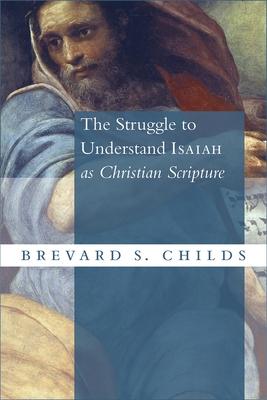A key emphasis of Brevard Childs's distinguished career has been to show not only that the canon of Scripture comprises both Old and New Testaments but also that the concept of -canon- includes the way the Christian church continues to wrestle in every age with the meaning of its sacred texts. In this new volume Childs uses the book of Isaiah as a case study of the church's endeavor throughout history to understand its Scriptures.
In each chapter Childs focuses on a different Christian age, using the work of key figures to illustrate the church's changing views of Isaiah. After looking at the Septuagint translation, Childs examines commentaries and tractates from the patristic, Reformation, and modern periods. His review shows that despite an enormous diversity in time, culture, nationality, and audience, these works nevertheless display a -family resemblance- in their theological understandings of this central Old Testament text. Childs also reveals how the church struggled to adapt to changing social and historical conditions, often by correcting or refining traditional methodologies, while at the same time maintaining a theological stance measured by faithfulness to Jesus Christ. In an important final chapter Childs draws out some implications of his work for modern debates over the role of Scripture in the life of the church.
Of great value to scholars, ministers, and students, this book will also draw general readers into the exciting theological debate currently raging in the Christian church about the faithful interpretation of Scripture.

Struggle to Understand Isaiah as Christian Scripture
A key emphasis of Brevard Childs's distinguished career has been to show not only that the canon of Scripture comprises both Old and New Testaments but also that the concept of -canon- includes the way the Christian church continues to wrestle in every age with the meaning of its sacred texts. In this new volume Childs uses the book of Isaiah as a case study of the church's endeavor throughout history to understand its Scriptures.
In each chapter Childs focuses on a different Christian age, using the work of key figures to illustrate the church's changing views of Isaiah. After looking at the Septuagint translation, Childs examines commentaries and tractates from the patristic, Reformation, and modern periods. His review shows that despite an enormous diversity in time, culture, nationality, and audience, these works nevertheless display a -family resemblance- in their theological understandings of this central Old Testament text. Childs also reveals how the church struggled to adapt to changing social and historical conditions, often by correcting or refining traditional methodologies, while at the same time maintaining a theological stance measured by faithfulness to Jesus Christ. In an important final chapter Childs draws out some implications of his work for modern debates over the role of Scripture in the life of the church.
Of great value to scholars, ministers, and students, this book will also draw general readers into the exciting theological debate currently raging in the Christian church about the faithful interpretation of Scripture.